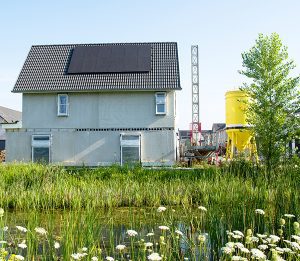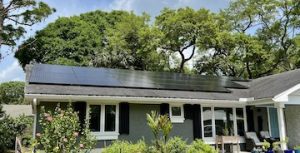Installing solar panels on your home can be an exciting and cost-effective way to reduce your electricity bills and contribute to a more sustainable future. However, many homeowners are opting to take on the task of installing solar panels themselves, rather than hiring a professional contractor.
While there are many reasons why someone might consider a do-it-yourself (DIY) solar panel installation, it’s important to weigh the potential risks and challenges before embarking on such a project.
In this blog post, we’ll take a closer look at the reasons why people consider DIY solar panel installation, as well as the challenges they may encounter and why it’s ultimately best to hire a professional solar contractor.
Reasons why people consider DIY installation
As an experienced solar panel installation contracting company, we understand why some homeowners may be tempted to try installing solar panels themselves.
One of the main reasons is the desire to save money on the installation costs. A DIY solar panel installation may seem like a way to cut down on the expenses associated with hiring a
professional contractor.
Additionally, some homeowners may take on a DIY solar panel installation as a fun and rewarding DIY project. They may enjoy the challenge of working with new technology and the sense of accomplishment that comes with completing the installation.
However, it’s important to remember that while a DIY solar panel installation may seem like a cost-effective solution in the short-term, it could end up costing more money in the long run if the system is not installed correctly.
Additionally, DIY solar panel installation may not meet the local building codes and regulations, and that could lead to fines and penalties. Also, if a DIY solar panel installation is not safe, it could lead to a serious injury or damage to property.
At SuperGreen Solutions, we urge all homeowners to weigh the potential risks and challenges of a DIY solar panel installation before embarking on such a project and consider hiring a professional solar contractor for a safe, effective, and long-lasting solar panel system.
Problems with DIY solar panel installation
DIY solar panel installation can present a number of challenges, even for experienced DIYers. One of the main challenges is the lack of technical knowledge and expertise required to properly design and install a solar panel system.
Understanding electrical systems, local building codes, and regulations is crucial in order to ensure the safety of the installation and that it will meet the necessary codes. In addition, safety hazards such as the risk of electrical shock or fire are a concern for DIY solar panel installation.
The lack of proper safety equipment such as electrical testing tools and fall protection can put the DIYer at risk if not handled correctly. Obtaining the necessary equipment and materials can also be a challenge for DIY solar panel installers, as inferior or faulty solar panels, inverters, and other equipment can lead to poor system performance and a shorter lifespan.
These challenges can result in a less efficient, less safe and less durable solar panel system installed.
Lack of technical knowledge and expertise
One of the biggest problems with a lack of technical knowledge and expertise in a DIY solar panel installation is the understanding of electrical systems. A solar panel system is a complex electrical system that requires proper design, installation, and maintenance to function effectively. Improperly installing a solar panel system can lead to poor performance, reduced efficiency, and even safety hazards. Furthermore, the lack of knowledge about local building codes and regulations can result in the solar panel system not being in compliance, which can lead to fines and penalties or even being required to undo the work.
Understanding electrical systems is critical in order to safely and effectively install a solar panel system. Without this knowledge, DIY installers may not know how to properly size and install the solar panels, inverters, and other components of the system, which can lead to poor performance and efficiency. A lack of knowledge about local building codes and regulations can also result in a system that does not meet code requirements and may even pose safety hazards to the homeowner and the surrounding community.
Solar panel city inspection
Your city inspector will inspect three (three) major components for any solar energy system:
- For any concealed wiring, rough electrical
- Grounding and electrical bonding
- Complete solar energy system inspection, including modules, panels, wire terminations, and grounding.
In addition, if you don’t have the proper knowledge about electrical systems, you may not be able to identify potential safety hazards such as overloading circuits, short circuits, or other issues that could lead to electrical shock or fire. Proper knowledge on electrical systems also involves knowing how to connect and disconnect the panels from the grid and ensuring the safety of the workers and family.
Given these risks and the complexity of solar panel systems, it’s clear that a DIY solar panel installation requires not just a willingness to learn, but also a significant amount of technical knowledge and expertise. Without this knowledge, a DIY solar panel installation can be dangerous and may not perform as expected, which could ultimately lead to a wasted investment.
Safety hazards
Safety is a major concern when it comes to DIY solar panel installations. Without proper knowledge and equipment, DIYers may be at risk of electrical shock or fire. Electrical systems carry a high level of electrical voltage, and even a small mistake can lead to serious injury or even death. It is important to understand how electricity behaves and how to work with it safely.
A lack of proper safety equipment is also a concern for DIY solar panel installers. Electrical testing tools, fall protection, and other safety gear are essential when working with electrical systems, and without them, DIYers may be at risk of injury. For example, when working on a roof, the DIYers must ensure the proper fall protection, that the ladder is stable, and that the roof is able to sustain their weight.
The benefits of hiring a professional solar contractor
First and foremost, a professional contractor will have the expertise and experience necessary to properly design and install a solar panel system that meets all local building codes and regulations. This will ensure that the system is safe, efficient and code compliant which could save homeowners from fines, penalties, and potential hazards.
Additionally, professional contractors have access to high-quality equipment and materials that are necessary for a successful solar panel installation. They will be able to source the highest quality solar panels, inverters and other components that can perform well and last long.
Furthermore, by hiring a professional contractor, homeowners will be able to take advantage of the contractor’s knowledge of available permits, subsidies and incentives. This can save homeowners money and ensure that they are getting the best value for their investment.
Finally, professional solar contractors can ensure that the system is properly maintained. Monitoring the system’s performance and fixing any errors or damages that could impact the efficiency or safety of the system.
While a DIY solar panel installation may seem like a cost-effective solution in the short-term, it’s important to consider the long-term benefits of hiring a professional solar contractor. With their expertise and experience, professional contractors can ensure a safe, efficient, and long-lasting solar panel system.
Quality of equipment
When it comes to solar panel installation, the quality of the equipment used can have a significant impact on the performance and longevity of the system. Professional solar panel installers have access to high-quality equipment that is designed to last, whereas DIYers may have more limited options when it comes to sourcing equipment.
Professional solar panel installers have access to a wide range of equipment and materials, and can choose the products that are best suited for the specific needs of a project. They use equipment from reputable manufacturers, who have been through rigorous testing to ensure that the products meet industry standards and perform well. The professional contractor will also have access to warranty, service and repair options in case of any defects or issues. This ensures that the equipment will be of a higher quality and last longer.
On the other hand, when homeowners attempt to install solar panels themselves, they may be limited to purchasing equipment from local stores or online retailers. This equipment may not be as high quality or reliable as the equipment used by professional installers, and may not be backed by the same warranties or guarantees. Additionally, DIYers may not know how to properly evaluate the quality of the equipment they are purchasing, and could end up with
faulty or inferior solar panels, inverters, and other equipment that may not perform as well or last as long as those used by professional installers.
Ultimately, the quality of the equipment used in a solar panel installation is a crucial factor in the overall performance and longevity of the system. Professional solar panel installers have access to high-quality equipment and the expertise to properly evaluate and install it, whereas DIYers may have more limited options and may not be able to ensure the same level of quality.
Cost-effectiveness
While a DIY solar panel installation may seem like a cost-effective solution in the short-term, hiring a professional solar installation contractor can ultimately save homeowners money in the long run.
First and foremost, professional solar contractors have the expertise and experience to properly design and install a solar panel system that is tailored to the specific needs of the homeowner. This can lead to greater energy efficiency, which can result in lower electricity bills over time. A well-designed and installed system also means that it will last longer and have a better performance.
Professional solar contractors also have access to a wide range of equipment and materials, and can choose the products that are best suited for the specific needs of a project while staying within the budget. They can also provide cost-effective solutions for maintenance and repairs. Furthermore, professional contractors have knowledge of available permits, subsidies and incentives that can help save money on the installation costs. This can make the overall cost of the solar panel system more affordable for homeowners.
Additionally, by working with a professional contractor, homeowners can ensure that the solar panel system is properly installed and meets all local building codes and regulations, avoiding
the fines, penalties or having to undo work that does not comply.
In contrast, a DIY solar panel installation may end up costing more money in the long run if the system is not installed correctly, due to improper equipment choice, or it doesn’t meet local regulations. By hiring a professional solar contractor, homeowners can save money in the long run while also enjoying a safe, efficient, and long-lasting solar panel system.
Obtain permits and incentives
Hiring a professional solar panel contractor has many benefits when it comes to obtaining permits and fixing any errors or damages that may occur during or after the installation.
One of the key benefits of hiring a professional contractor is their expertise in navigating local building codes and regulations. Solar panel systems require permits and inspections to ensure that they are installed safely and in compliance with local regulations. Professional contractors are familiar with the permitting process and can ensure that all necessary permits are obtained and that the system is installed to meet code requirements. This can save homeowners from the hassle and potential fines of navigating the permitting process themselves.
In addition, professional contractors are experienced in identifying and fixing any errors or damages that may occur during or after the installation. They have the knowledge and expertise to troubleshoot and repair any issues with the solar panel system, ensuring that it continues to perform at its best. This includes regular monitoring and maintenance of the system which can also increase the lifespan of the equipment.
In the case of an emergency, professional contractors will have the necessary knowledge and resources to handle the situation promptly, minimizing the risk of costly damage or further issues. They will have the tools and equipment necessary to repair any errors or damages, which can often be difficult for homeowners to acquire or repair by themselves.
In short, hiring a professional solar panel contractor provides homeowners with the peace of mind that their system is properly permitted, installed, and maintained and that any issues that may arise will be handled in a timely and professional manner. This will ensure that the solar panel system performs at its best, is safe and in compliance with the regulations and codes.
Conclusion
In conclusion, installing a solar panel system on your home can be an exciting and cost-effective way to reduce your electricity bills, but it also requires a significant amount of technical knowledge and expertise.
Attempting a DIY solar panel installation may seem like a cost-effective solution in the short-term, but it could end up costing more money and posing safety hazards in the long run if the system is not installed correctly. With a lack of knowledge about local building codes and regulations, not understanding electrical systems, safety hazards and lack of proper safety equipment, it can be risky undertaking such a project.
Hiring a professional solar contractor is the best option to ensure a safe, efficient, and long-lasting solar panel system that complies with codes and regulations. They have the knowledge and resources to properly design and install the system, source high-quality equipment, obtain necessary permits and subsidies, maintain and troubleshoot the system, which ultimately save homeowners money in the long run.





